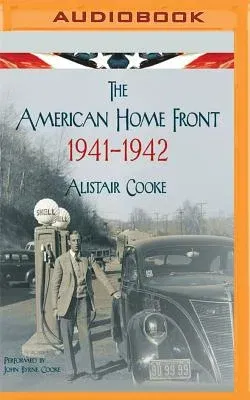In nearly three thousand BBC broadcasts over fifty-eight years, Alistair
Cooke reported on America, revealing our country's complexities and
idiosyncrasies to a global audience. He was one of the most widely read
and widely heard chroniclers of America - the Twentieth Century's de
Tocqueville.
Shortly after the bombing of Pearl Harbor in 1941, Alistair Cooke, a
newly naturalized American citizen, set out to see his country as it was
undergoing monumental change. He wanted to "see what the war had done to
people, to the towns I might go through, to some jobs and crops, to
stretches of landscape I loved and had seen at peace." Working
throughout the war, Cooke finished The American Home Front as the
atomic bomb was being dropped on Hiroshima. His publisher thought there
would be little interest in books on the war, so it was stuffed in a
closet. It stayed there for almost sixty years, nearly forgotten, until
it was unearthed shortly before Cooke's death in 2004.
The American Home Front is a fascinating artifact, a charming
travelogue, and a sharp portrait that shows America changing from
civilian pursuits to military engagement, from the production of
consumer goods to materials of war. It is also a unique record of
American life. Cooke travels small highways, with their advertising
signs and their local typography, in an age before the interstate
highway system. He chronicles the regional glories he encounters,
elements of long-lost culture such as his beloved soda fountains, and
the reactions of the citizens, from indifference to grief, from
opportunism to resilience under military threat. Filled with touching
personal stories of the effects of war, from a Japanese family facing
internment that tries to sell Cooke their car, to the experiences of the
unemployed relocating in hopes of jobs in a gunpowder factory, The
American Home Front is the work of an experienced, talented journalist;
it is intelligent, touching, and funny.

